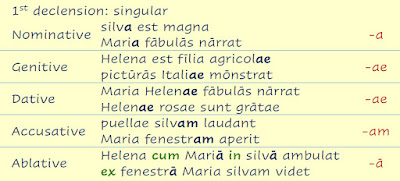[A]
[i] (1) They are happy to go / willingly go
│ libenter eunt; (2) the teacher will tell a story (3) about
Caesar │ (2) magister fābulam ¦ (3) dē Caesare (2) nārrābit
[ii] their tutor │ paedagōgus
[iii] (a) F; (b) T; (c) F; (d) F; (e) T; (f) F
[iv] the pupils are (1) attentive / diligent; (2) everything is done /
happens very quickly / with great speed; (3)
styluses and tablets are soon put down (3) it becomes
silent │ In lūdō discipulī sunt (1) dīligentēs et (2)
omnia magnā cum celeritāte fīunt. (3) Mox stilī
tabellaeque dēpōnuntur et (4) silentium fit.
[B] “Ad multās terrās Caesar iit et multōs annōs cum
incolīs eārum terrārum bellum gessit. Ā Galliā Rōmam multa
spolia tulit et propter magnās victōriās imperātor factus
est. Fortasse vōs quoque, meī discipulī, fīētis magnī
ducēs. Tum ad terrās extrēmās ībitis et cum hostibus
bellum gerētis. Multa spolia et clārōs obsidēs Rōmam ferētis.”
[C]
[i] (1) For a long time it has
already been the custom (2) for (of) pupils of many countries (3) to read the
commentaries (4) of the Gallic War (5) written by Caesar himself; (6) they
always like [literally: it always pleases them] (7) to read the words of
Caesar.
[ii] no: at times difficult, at
times easy │ Iam difficile est …; iam facile
est
[iii] (1) very happy │ magnum
gaudium; (2) the teacher will read a story (3) written by Caesar │ (1) magister
fābulam (3) ā Caesare scrīptam (2) leget
[iv] (1) put down their (2)
pencils and boards │ (2) stilōs tabellāsque (1) dēpōnere
[v] Many are rather difficult
│ multae sententiae sunt difficiliōrēs
[vi] (a) repeat them │ īsdem verbīs reddere
[literally: to give back with the same words] (b) don’t need
[lierally: will not be necessary] to do the same thing │ Nōn
necesse erit vōbīs eadem agere.
[vii] with the greatest / very
great attention │ maximā cum dīligentiā
[D]
[i] three parts │ partēs trēs
[ii] inhabitants of
Gaul │ quārum ūnam incolunt …
[iii] language, customs, laws │
Hī omnēs linguā, īnstitūtīs, lēgibus inter
sē differunt
[iv] rivers │ Garumna flūmen;
flūmina Mātrona et Sēquana
[v] (1) The Garumna (Garonne)
divides / separates the Gauls (2) from the Aquitanians; (3) the Matrona (Marne)
and Sequana (Seine) divide them (4) from the Belgae │ (1) Gallōs ¦ (2) ab
Aquītānīs ¦ (1) Garumna flūmen dīvidit; (3) eōs ¦ (4) ā Belgīs ¦ (3) flūmina
Mātrona et Sēquana dīvidunt.
[E]
[i]
(he) willingly goes │ libenter it
(they) willingly go │ libenter eunt
Caesar went │ Caesar iit
you (pl.) will go │ ībitis
[ii]
Aulus … brings a helmet │ Aulus
galeam … fert
Lucius … brings a shield │ Lūcius
scūtum … fert
you
(pl.) will bring │ ferētis
The boys … bring │ puerī
… ferunt
(he) brought many spoils from
Gaul ¦ to Rome │ Ā Galliā Rōmam multa spolia tulit
the weapons which … Marcus
brought ¦ from Gaul │ Tēla quae … Mārcus ¦ ā Galliā attulit
they differ from each other
│ inter sē differunt
[iii]
It becomes silent │ silentium fit
you (pl.) will become great
leaders │ vōs … fīētis magnī ducēs
Everything happens [ = all
things are done] with great speed │ omnia magnā cum celeritāte fīunt
(he) became / was made commander
│ imperātor factus est
[F]
- The teacher’s stories also delight him │ Fābulae magistrī eum quoque dēlectant
- They always like [literally: it always pleases them …] to read Caesar’s words │ Semper eōs iuvat Caesaris verba legere
- It will be necessary … to pay attention │ Erit necesse … operam dare
- It will not be necessary for you ¦ to do the same things. │ Nōn necesse erit vōbīs eadem agere
- It is difficult to understand │ Difficile est … intellegere
- For a long time it has been [ = it is] the custom for pupils … to read the commentaries … │ Iam diū mōs est discipulōs … commentāriōs … legere
- The teacher tells [orders / commands] the pupils ¦ to put down the pencils. │ Magister iubet discipulōs stilōs tabellāsque dēpōnere
- He tells (them) all ¦ to listen to / “take in” the words │ Deinde iubet omnēs … verba accipere






